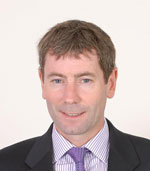Nick Ford of Scottish Widows is excited by prospect of manufacturing renaissance in the US and wants companies to put cash to work
Nick Ford, a fund manager at Scottish Widows who has been investing for 21 years, believes the US economy will bounce back this year and wants company directors to hire employees and invest in new products.
Ford has just got back from a visit to the US, where he met management teams of companies including Harley-Davidson in Milwaukee. ‘The feedback from companies is positive… we think the US economy will do a lot better than expected this year,’ he says. His perspective on directors’ comments is informed by experience of working in Philadelphia during the early 2000s, when he jointly managed the Gartmore US Smaller Companies Fund.
His perspective on directors’ comments is informed by experience of working in Philadelphia during the early 2000s, when he jointly managed the Gartmore US Smaller Companies Fund.
Harley-Davidson stands out as one of Ford’s biggest overweight positions, relative to the S&P 500 Index. He says the motorcycle maker’s management told him it was ‘extremely positive’ about the restructuring of its manufacturing operations.
Emerging markets focus
Investors at Scottish Widows aim to identify companies with unique brands and businesses, which have opportunities to grow in overseas markets, given the rise of India and China.
As for Harley-Davidson’s international potential, Ford regards it as significant. ‘Only very recently has the management team begun to tackle overseas markets such as India and China,’ he says.
In the light of the demand from the Chinese middle classes for US consumer goods, Ford expects significant growth, explaining that Harley has only a handful of dealerships in the country.
And he anticipates better news elsewhere: ‘The biggest market is India, where the company has barely scratched the surface. It will export its bikes in kit form for assembly later.’
Another Wall Street secret
Brunswick, a US company in the marine, fitness, bowling and billiards industries, is another of Wall Street’s better kept secrets, according to Ford.
The business sells motor yachts and fishing boats, which evoke a dream for aspirational Americans. ‘People have deferred buying boats or replacing old ones, so we think there’s huge pent-up demand,’ says Ford.
As for the other side of the company’s profit and loss account, he respects its cost-cutting, which it brought about by closing manufacturing plants.
He has also dug for growth by backing Airgas, which sells packaged gas to industrial customers – it provides power for welding, to give one example.
Ford respects Airgas’ business model, because ‘it’s a local market, in which customers need suppliers that are close enough to distribute … the packaged gas at the facilities.’
He speaks highly of the managers’ improvements to the company’s operational efficiency and cites their move from several IT systems to a single set of commercial software.
Manufacturing renaissance
Ford believes ‘US manufacturing is having a renaissance.’ In the fourth quarter, manufacturing production rose at an annual rate of 3.9 percent, according to the Federal Reserve.
As conditions improve, companies should put to work the spare cash they built up during the hard times, says Ford.
‘Companies have so much [cash] because they cut costs in the downturn,’ he explains. ‘When management teams see concrete evidence of an improvement, they must hire people, invest in new products and use the best IT.’










